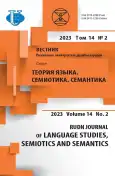Emotions in the Mental and Linguistic Space of Lyric Poems
- Authors: Sinelnikova L.N.1
-
Affiliations:
- Lugansk State Pedagogical University
- Issue: Vol 14, No 2 (2023)
- Pages: 466-482
- Section: LITERARY TEXT LINGUISTICS
- URL: https://journal-vniispk.ru/2313-2299/article/view/323440
- DOI: https://doi.org/10.22363/2313-2299-2023-14-2-466-482
- EDN: https://elibrary.ru/LZNZYS
- ID: 323440
Cite item
Full Text
Abstract
The article is based on a report given in course of the round table meeting 'Language as an art', dedicated to the 90th anniversary since the birth of the outstanding linguist L.A. Novikov, whose reknown works on the issues of linguistic meaning and the aesthetic aspects of language have attracted wide critical acclaim and become a valuable part of philology as a science. The choice of the topic is methodologically adjusted to L.A. Novikov’s conception of verbal arts, which is succinctly represented in the term 'poetheme'. Emotives (vocabulary that names, expresses and describes emotions) can be categorised as poethemes, since the verbalisation process of emotions in poetry is related to their aesthetic transformation. The description of emotions in the article is conducted in multiple directions, each of which is significant in order to understand the specifics of the verbalisation of emotions in poems. The author relates the new aspect of viewing the poetic semantics of emotives to the influence of the grammatical meaning of the verb mood on the illocutionary function of verbalised emotions that take part in the declaration of intent. Besides, the imperative mood and the infinitive accentuate the extravert semantics (emotions for others and for oneself), the subjunctive mood being introvert (emotions for oneself). Additional information regarding the contextual features of emotions could be acquired through the emphasis on the indefinite, demonstrative, negative and possessive pronouns, which accompany emotives. The article demonstrates that metaphorical rows of emotions organise the personal mental image of the poet’s world. Basic poetic emotions, established due to the fact of attractiveness (mutual attraction, approach), are related to Russian mentality as a whole. The range of problems dealt with in the article is significant to filling the forming term 'emotional picture of the world’ with content.
About the authors
Lara N. Sinelnikova
Lugansk State Pedagogical University
Author for correspondence.
Email: prof.sinelnikova@gmail.com
ORCID iD: 0000-0001-8140-5648
SPIN-code: 3053-7270
Doctor of Philology, Professor, Professor of the Department of Russian Linguistics and Communication Technologies
2, Oboronnaya str., Lugansk, Russian Federation, 91011References
- Novikov, L.A. (1982). The Art of the Word. Moscow: Pedagogika. (In Russ.).
- Feshchenko, V.V. (2021). Literary communication: from semiotic models to a theory of linguistic aesthetics. Slovo.ru: baltic accent, 12(1), 7–31. https://doi.org/10.5922/22255346-2021-1-1 (In Russ.).
- Novikov, L.A. (2001). Selected works. Vol. II. Aesthetic aspects of language. Miscellanea. Moscow: RUDN publ. (In Russ.).
- Novikova, M.L. (2010). The Сreative Potential of Ostrannenie. Functional and Grammatical Principle of Ostrannenie Sing Structure Study. RUDN Journal of Language Studies, Semiotics and Semantics, 2, 19–27. (In Russ.).
- Shvets, A. (2021). Estrangement as a way of cognition: problems and prospects. International round table “Surprise from the text: ostran (n) in the aspect of cognitive pragmatics” (Moscow State University, March 29, 2021). New Literary Review, 5(171). (In Russ.).
- Temirgazina, Z.K. (2022). A Poeteme as a Tool for the Analysis of a Lyrical Text in L.A. Novikov’s Concept of Language as Art. RUDN Journal of Language Studies, Semiotics and Semantics, 13(2), 249–261. https://doi.org/10.22363/2313-2299-2022-132-249-261 (In Russ.).
- Shakhovsky, V.I. (2019). Emotional worldview of the in verbal presentation. Russian Word World, 1, 35–43. (In Russ.).
- Ionova, S.V. (2022). Linguopsychology of emotions in the modern linguistics concepts. Journal of Psycholinguistics, 1(51), 26–39. https://doi.org/10.30982/2077-5911-202251-1-26-39. (In Russ.).
- Kolyadko, S.V. (2021). Emotive analysis of a poetic work. Verkhnevolzhsky. Philological Bulletin, 1(24), 45–51. https://doi.org/10.20323/2499-9679-2021-1-24-4551. (In Russ.).
- Korzhavin, N. (1991). Playing with the devil (About Alexander Blok's poem “To the Muse”. In: Poetry: Almanac. Iss. 59. Moscow: Molodaya gvardiya. (In Russ.).
- Vasileva, A.А. (2021). Imperative Statements — one of the Forms of Representation of a Linguistic Personality. RUDN Journal of Language Studies, Semiotics and Semantics, 12(1), 185–195. https://doi.org/10.22363/2313-2299-2021-12-1-185-195. (In Russ.).
- Milyutina, M.G. (2021). Functional grammar in the service of poetry (infinitive writing in poetical texts by B. Akhmadulina, I. Brodsky, A. Kushner). Siberian Journal of Philology, 4, 276–288 https://doi.org/10.17223/18137083/77/21. (In Russ.).
- Panteleeva, G.V. (2019). Definition of the term anticipation in Russian psychology. Scientific notes of the P.F. Lesgaft University, 8(174), 282–288. (In Russ.).
- Sidorova, M.Yu. & Lipgart, A.A. (2018). Grammar of modern Russian poetry: linearization and syntactic techniques. The world of the Russian word, 3, 52–71. (In Russ.).
- Severskaya, O.I. (2020). “Stay with me. Talk to me”: reader interaction strategies in modern poetry. Communication Studies, 7(2), 419–436. (In Russ.).
- Fedyunina, G.V. (2009). Pronouns in the context of cognitive linguistics. Siberian Philological Journal, 3, 124 —128. (In Russ.).
- Kiseleva, L.A. (2020). Modern linguistics of emotions: postclassical stage. Philological sciences. Scientific reports of the higher school, 2. 11–18. (In Russ.).
- Bogoyavlenskaya, Y.V. (2018). Parcelling as a cognitive and semiotic phenomenon. Tomsk State University Journal of Philology, 55, 5–16. https://doi.org/10.17223/19986645/55/1. (In Russ.).
- Kozhevnikova, N.A. (1990). Sound organization of verse. In: Essays on the history of the language of Russian poetry of the XX century. Poetic language and idiostyle: General questions. Sound organization of the text. Moscow: Nauka. (In Russ.).
Supplementary files









